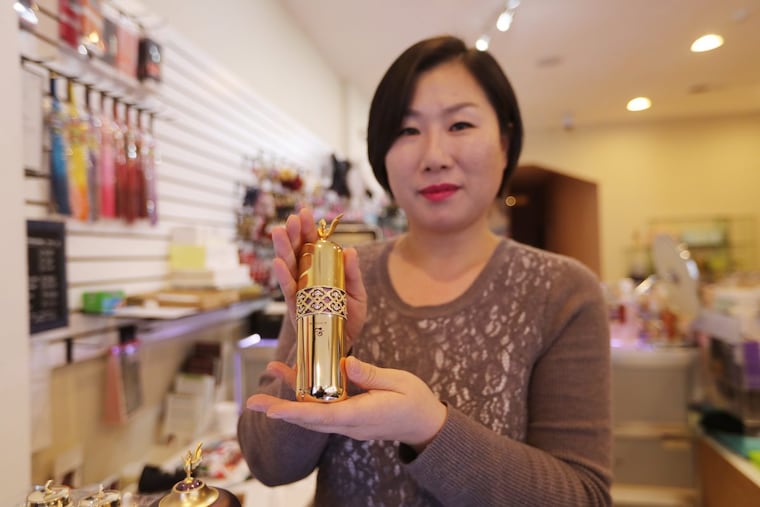You can now buy a $1,100 Korean skin serum in Chinatown
This storeowner is taking a local bet on the K-beauty craze.

On the outskirts of Chinatown, nestled between an accountant's office and a liquid nitrogen ice cream shop, a glass case holds a line of products that some women believe can stop time.
Made of seemingly fantastical ingredients including deer antler extract, wild ginseng and snow lotus herb, and bottled in royal-purple jars with a phoenix atop the lid, the History of Whoo's Hwanyu line claims to bring you closer to immortality, or just look like it. It's among the top tier of Korean skincare products, with a price tag to show for it: 25 milliliters of eye cream costs $420, while a 60-milliliter jar of face cream is $750. But the crown jewel is the signature ampoule, a long golden tube filled with a concentrated serum that's said to be akin to Botox — minus the botulism.
"My skin is vibrant, alive and glowing," said one fan on Reddit's thriving AsianBeauty forum. "Now I can finally see what it means to take perfection beyond perfection."
It costs $1,100.
The craze around Korean beauty, or K-beauty, has barreled forward in the last few years, with mainstream Western retailers like Sephora, Target and CVS all selling and marketing Asian beauty products, and Korean 10-step skincare routine YouTube videos being produced by the hundreds. Here in Philly, Jeanne Lee is betting the trend will stick: She opened Ga-In BeautyZone in March 2015, a store that, with a few exceptions, exclusively sells Korean beauty products. The Chinatown location was strategic — China is a massive market for Korean beauty companies.
(Looking for Asian beauty products in the Philly region? Here's our insider's guide.)
A native of Jinju, South Korea, who moved to Philadelphia with her family when she was 18, Lee, now 45, has yet to sell the ampoule (she just started stocking it), but her older customers do come for the other creams and serums of the History of Whoo's pricey purple Hwanyu line. Her most popular History of Whoo products are the slightly more affordable Cheongidan line, which she refers to as the "yellow line," $680 for a 10-piece set. Lee also stocks a range of other brands for varying budgets, like Su:m37, Isa Knox and Beyond, all owned by Korean chaebol LG, plus stacks and stacks of sheet masks — pieces of face-shaped fabric drenched in serum that you unfold and leave on your face for 20 minutes.
Outside of partnering with Western retail giants, Korean brands test demand within the U.S. market by selling through ecommerce sites like Soko Glam and Peach & Lily, said K-beauty consultant Ju Rhyu. But you can't get everything online, and even then, the threat of fakes abound.
Patrapan Juntavee, a fledgling orthodontist and 31-year-old mother of two whose 14-step skincare routine mostly comprises products she purchased at Ga-In, says she prefers to shop at the Chinatown boutique because she knows she's getting the real thing. (Lee says that sometimes customers ask to see her invoices as proof that what she's selling is legit.) Plus, Juntavee said, Lee and sales associate Linda Xu are patient, helpful and generous with gifts and samples. In the dizzying world of K-beauty, sometimes you need a guide.
But can a brick-and-mortar store that only sells K-beauty survive?
Despite the Korean skincare buzz, Lamei Zhang of the Philadelphia Chinatown Development Corporation says the neighborhood has not seen a proliferation of beauty stores, though shops offering beauty services are becoming more common. (Ga-In, like its fellow Asian beauty stores 931 Skincare in Chinatown and 2050's Beauty & Cosmetic on Washington Avenue, offers services like facials and eyelash extensions in private rooms at the back of the store.)
There are other Philadelphia stores that sell the high-end Korean products stocked by Ga-In — in the H-Mart at 69th Street and in the plaza at Sixth and Washington Avenue — but they appear to cater specifically to Asian customers, while Ga-In's central location taps a wider audience. Xu says in the earlier days, Ga-In's clientele was largely Asian, but that has since changed. She remembers how one morning she came to open the shop at 10:30, as she usually does, and was surprised to find a white woman waiting for her. "Is this the Korean cosmetics store?" the woman asked.
Lee, a former property manager who once ran a cosmetics and health food store at 69th Street, thinks an image change will boost the store's visibility. Next month, she'll rebrand as a Nature Collection franchise, hoping to capitalize on the brand of a well-known (and also LG-owned) Korean cosmetics store that's been opening U.S. locations, including one in North Wales' Korean mega-grocer Assi Plaza. Lee's store will be the first Nature Collection spot in the city.